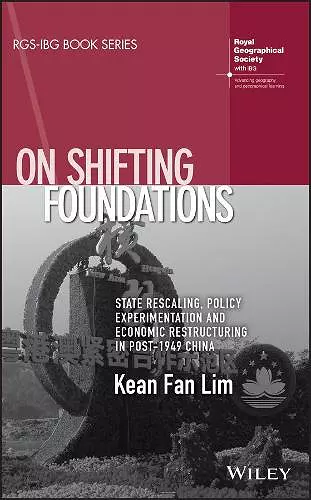On Shifting Foundations
State Rescaling, Policy Experimentation and Economic Restructuring in Post-1949 China
Format:Paperback
Publisher:John Wiley & Sons Inc
Published:1st Mar '19
Currently unavailable, and unfortunately no date known when it will be back
This paperback is available in another edition too:
- Hardback£60.00(9781119344551)

This book introduces readers to the current social and economic state of China since its restructuring in 1949.
- Provides insights into the targeted institutional change that is occurring simultaneously across the entire country
- Presents context-rich accounts of how and why these changes connect to (if not contradict) regulatory logics established during the Mao-era
- A new analytical framework that explicitly considers the relationship between state rescaling, policy experimentation, and path dependency
- Prompts readers to think about how experimental initiatives reflect and contribute to the ‘national strategy’ of Chinese development
- An excellent extension of ongoing theoretical work examining the entwinement of subnational regulatory reconfiguration, place-specific policy experimentation, and the reproduction of national economic advantage <
'In this foundational investigation, Kean Fan Lim shows how contemporary Chinese urbanization has been stimulated through new state policies designed to territorialize transnational capital investment. These rescaled state spaces have, he argues, figured centrally in the production of new forms of uneven development across the national territory. This systematically researched, lucidly argued book is an essential resource for anyone concerned to understand the contemporary urban condition, whether in China or elsewhere.'
Neil Brenner, Professor of Urban Theory, Graduate School of Design, Harvard University
'Kean Fan Lim makes a breakthrough in existing studies of the Chinese political economy by astutely integrating a multi-scalar and historically grounded framework to illustrate the rationale and effects of economic restructuring in contemporary China. The empirical focus on the ‘nationally strategic new areas’ offers an important platform for understanding the regulatory challenges facing Chinese policymakers across different scales.'
Weidong Liu, Professor in Economic Geography, Institute of Geographical Sciences and Natural Resources Research, Chinese Academy of Sciences
'This book is the first systematic treatment of China’s state rescaling and an innovative application to the widespread ‘nationally strategic new areas’ in China. Kean Fan Lim should be congratulated for successfully tackling the concept of scale and state rescaling and for demonstrating their analytical power to understand China’s regional development.'
Fulong Wu, Bartlett Professor of Planning, The Bartlett School of Planning, University College London
‘Published as part of the RGS-IBG book series, this publication details a significant aspect of China’s economic reform, namely, ‘crossing the river by feeling for stones’ (p. 1). This metaphor has long been used to illustrate that China’s transition to a market economy has no precedent and cannot rely on other countries’ experiences for guidance and, hence, must be a trial-and-error process. Rather than taking this aspect for granted, the book argues that this process foregrounds the nature of China’s political economy, and that these longstanding policy experimentation practices therefore warrant detailed examination. As highlighted in chapters 1 and 2, for example, this process is shown not to be specific to China’s post-economic reform; rather, it is an inherent process that is commonly used by the Communist Party of China (CPC).’
Yi Li, National Research Centre for Resettlement, Hohai University, Nanjing, China
(Regional Studies, 2019)
‘As one of the few book-length studies of contemporary issues around state-rescaling and New Area development in China, Lim’s work breaks important ground. Challenging uncritical application of Western state rescaling theories to the Chinese context, the book stakes out a new position from which to challenge the narrative of China’s post-1978 development as part of a global neoliberal shift. And with its carefully contextualized case studies of New Area development in Guangdong and Chongqing, the study provides a useful resource for China scholars as well as students of geography, urban planning and political economy seeking to understand the politics and policy logics behind spatially differentiated governance in China.’
Kyle A. Jaros, Oxford School of Global and Area Studies (The China Quarterly, Volume 241, March 2020)
‘Kean Fan Lim’s new book, On Shifting Foundations, brings together two hitherto entirely separate literatures on the re-scaling of states, which developed mainly in relation to European and US case studies, and on the enormous spatial reorganization of the Chinese economy since the 1980s. To these topics it adds an interesting discussion of prior reorganization during the periods of the Great Leap Forward and the Cultural Revolution, from the late 1950s until the 1970s.’
John Agnew, UCLA and recipient of the Vautrin-Lud Prize (Political Geography, book review forum, Volume 83, November 2020)
‘Kean Lim’s On Shifting Foundations: State Rescaling, Policy Experimentation and Economic Restructuring in Post-1949 China is an important contribution to our understanding of contemporary industrial geography. Each chapter and the cases contained within them are richly detailed, with each bound together by a unified theoretical thread.’
Ashok Kumar, University of Birkbeck, UK (Urban Studies, book review symposium, June 2021)
‘Overall, this is an excellent book, rich in conceptual ideas and empirical details. It should be on the bookshelves of scholars interested in urban and regional change in China.’
Jiang Xu, Chinese University of Hong Kong (The China Journal, No. 86, July 2021)
ISBN: 9781119344568
Dimensions: 226mm x 150mm x 13mm
Weight: 336g
256 pages